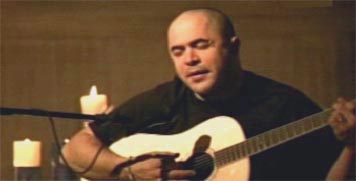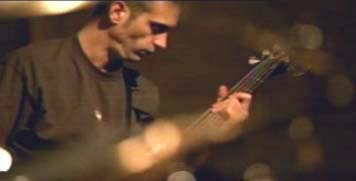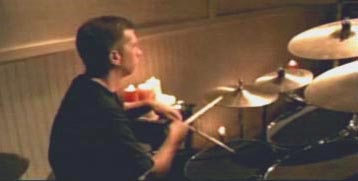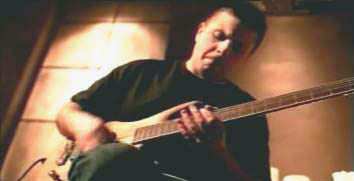|
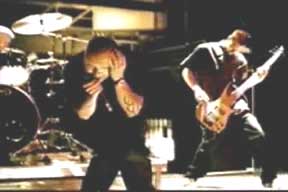 It isn’t necessary to know
Aaron or see him perform live in order to get a clear understanding of where
Staind’s forceful music comes from. Without a doubt, the driving force behind
Staind lies in Aaron’s expression of pent up emotions and anger that shapes who
he is. Without the ideal childhood or perfect life, Aaron remains a private and
introspective person who has a difficult time revealing what Staind’s music
reflects. However, when he goes on stage, Aaron holds back nothing. It isn’t necessary to know
Aaron or see him perform live in order to get a clear understanding of where
Staind’s forceful music comes from. Without a doubt, the driving force behind
Staind lies in Aaron’s expression of pent up emotions and anger that shapes who
he is. Without the ideal childhood or perfect life, Aaron remains a private and
introspective person who has a difficult time revealing what Staind’s music
reflects. However, when he goes on stage, Aaron holds back nothing.
Born on April 13, 1971 in
Rutland, Vermont, Aaron grew up in what he considers a troubled family. He grew
up in a log cabin on the side of a mountain with only a dirt road leading to
it. His hippie parents, Ted and Sondra, grew weed in pots in the front yard.
Although it seems unlikely, Aaron’s first musical influences came from the music
his parents, who performed in a folk band, listened to – James Taylor, Harry
Chapin, and Crosby, Stills and Nash. By the time Aaron was 10, his parents had
separated and reunited more than once: "My parents probably split up and got
back together again at least 10 or 12 times. One time I would go off with
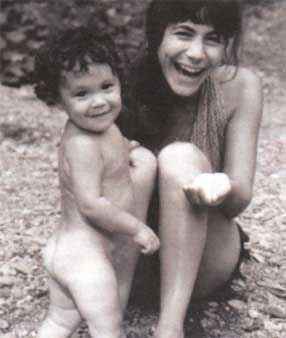 my
dad, and the next three times I would go with my mom. Sometimes my dad would
leave, sometimes my mom would leave. I don't really want to go too far into it,
but it wasn't always great." He continues, “It was obvious something between
them wasn’t right. It almost seems like they should never have been together,”
tells Aaron. Things didn’t improve when they moved to New Hampshire in 1980.
“My dad is very much like I am: laid back and kind of a procrastinator. My mom
is the complete opposite.” Calling himself a “chip off the ol’ block,” Aaron
appeared to be close to his dad as a child. The two fished a lot near his
grandfather’s property in Vermont. However, Aaron’s father admits there were
difficulties in the family. “I felt like I have him plenty of time,” Ted says.
“But I think in the younger days, I’m not so sure we wanted to be married or
even have children at that point. And Aaron probably felt that.” Indeed he
did, as written in the lyrics to “Fade” off Break The Cycle – “You were
never there for me to express how I felt I just stuffed things down.” “There
wasn’t much of a safe home atmosphere,” Aaron explains. “There wasn’t the
feeling of a tight-knit family. My grandfather died, and his whole side of the
family may as well have died with him, because we were basically disowned. To
have half my family disappear left we with a lot of abandonment issues.” While
Aaron’s relationship with his father was decent, it was not so good with his
mother, Sondra. “Me and my mom had a big blowout when I was thirteen or
fourteen. At the end, I basically told her not to call me and to stay the fuck
out of my life. That lasted for three or four years.” Over the years, however,
Aaron’s relationship with his dad has improved. While on tour, Aaron still
calls Ted up, and the two still go fishing. And it was only recently that Aaron
told his father about the troubles he faced years ago as a child. “I though we
had such a close relationship,” his father says. “But he held it in. That’s
probably where some of his anger came from.” my
dad, and the next three times I would go with my mom. Sometimes my dad would
leave, sometimes my mom would leave. I don't really want to go too far into it,
but it wasn't always great." He continues, “It was obvious something between
them wasn’t right. It almost seems like they should never have been together,”
tells Aaron. Things didn’t improve when they moved to New Hampshire in 1980.
“My dad is very much like I am: laid back and kind of a procrastinator. My mom
is the complete opposite.” Calling himself a “chip off the ol’ block,” Aaron
appeared to be close to his dad as a child. The two fished a lot near his
grandfather’s property in Vermont. However, Aaron’s father admits there were
difficulties in the family. “I felt like I have him plenty of time,” Ted says.
“But I think in the younger days, I’m not so sure we wanted to be married or
even have children at that point. And Aaron probably felt that.” Indeed he
did, as written in the lyrics to “Fade” off Break The Cycle – “You were
never there for me to express how I felt I just stuffed things down.” “There
wasn’t much of a safe home atmosphere,” Aaron explains. “There wasn’t the
feeling of a tight-knit family. My grandfather died, and his whole side of the
family may as well have died with him, because we were basically disowned. To
have half my family disappear left we with a lot of abandonment issues.” While
Aaron’s relationship with his father was decent, it was not so good with his
mother, Sondra. “Me and my mom had a big blowout when I was thirteen or
fourteen. At the end, I basically told her not to call me and to stay the fuck
out of my life. That lasted for three or four years.” Over the years, however,
Aaron’s relationship with his dad has improved. While on tour, Aaron still
calls Ted up, and the two still go fishing. And it was only recently that Aaron
told his father about the troubles he faced years ago as a child. “I though we
had such a close relationship,” his father says. “But he held it in. That’s
probably where some of his anger came from.”
 As though his family
wasn’t turbulent enough, Aaron experienced more pain outside the home, if that
even existed. “A few bad people in the neighborhood,” he says, “tended to pick
me out. They didn’t just beat me up. It was a little more than that.” Only
Aaron knows what that means, but he says it involves deep scars of alienation
and permanent damage. “I haven’t [gone there] yet, and I’m not going to now,”
he explains. “I was the sensitive kid. I was the kid who, if he got picked on,
would run home crying. Even my friends – I would be the brunt of their jokes.
People liked the reactions they got out of me. And I always gave them a
reaction.” In another interview he says, “I wasn’t a very well-adjusted kid.
I’ve always been the sensitive guy. I’ve never been able to just let things
slide off my shoulders or let people’s comments not bother me. I don’t have
very high self-esteem, and I’m not the most self-confident person. I tend to be
very hard on myself. His years at Pleasant Valley High School weren’t any
better. He expresses the pain of being the loneliest sophomore and his lack of
focus. “Choir was the only thing I got A’s in. I even failed gym, because I
wouldn’t change into gym clothes.” But even as young as he was, he already
displayed talent necessary to put him where he is today. After performing at
talent shows or battle of the bands, he received sudden attention. “That was
the only time girls were interested in me,” he says. Nevertheless, he still
feels the torment high school caused. “When I look back, it’s like ‘Fuck all of
you.’ My ten-year reunion was last year. I was going to have the tour bus drop
me off. But then I was like, ‘Fuck that.’” As though his family
wasn’t turbulent enough, Aaron experienced more pain outside the home, if that
even existed. “A few bad people in the neighborhood,” he says, “tended to pick
me out. They didn’t just beat me up. It was a little more than that.” Only
Aaron knows what that means, but he says it involves deep scars of alienation
and permanent damage. “I haven’t [gone there] yet, and I’m not going to now,”
he explains. “I was the sensitive kid. I was the kid who, if he got picked on,
would run home crying. Even my friends – I would be the brunt of their jokes.
People liked the reactions they got out of me. And I always gave them a
reaction.” In another interview he says, “I wasn’t a very well-adjusted kid.
I’ve always been the sensitive guy. I’ve never been able to just let things
slide off my shoulders or let people’s comments not bother me. I don’t have
very high self-esteem, and I’m not the most self-confident person. I tend to be
very hard on myself. His years at Pleasant Valley High School weren’t any
better. He expresses the pain of being the loneliest sophomore and his lack of
focus. “Choir was the only thing I got A’s in. I even failed gym, because I
wouldn’t change into gym clothes.” But even as young as he was, he already
displayed talent necessary to put him where he is today. After performing at
talent shows or battle of the bands, he received sudden attention. “That was
the only time girls were interested in me,” he says. Nevertheless, he still
feels the torment high school caused. “When I look back, it’s like ‘Fuck all of
you.’ My ten-year reunion was last year. I was going to have the tour bus drop
me off. But then I was like, ‘Fuck that.’”
Before Aaron met Mike Mushok at
a Christmas party, he was doing acoustic gigs and was hoping to put a band
together. He had held jobs in construction, burger flipping, and landscaping.
After meeting Mike, Aaron moved to Atlanta, Georgia for ten months, where he
attended a goldsmith school to work at a jewelry store run by his mom’s family
as a back up plan if music didn’t work out. While in Atlanta, his friends Tim
and Mitch turned him away from U2, Led Zeppelin, and James Taylor, in favor of
Pantera and Sepultura, heavy metal he had previously ignored. “The option was
given to me to go to school and learn it [gold-plating] and come back and work
at the family je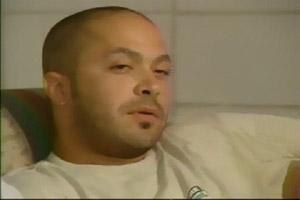 welry
store,” tells Aaron. “And it didn’t work out. If I hadn’t come back, none of
this would have happened. I never would have hooked up with Mike. And I ended
up going and working for a different place, and that was how I ended up
round-about hooking up with him, because a friend of his worked where I went to
work.” He goes on to say, “I just excelled more in the creative part of making
jewelry than I did in fixing it. When I came back to work for the store, I was
supposed to be fixing stuff. And, that wasn’t what I was best at. You know,
the family jewelry store, it had a good reputation, and I can’t be ruining
people’s jewelry when they bring it in to have it fixed. So it didn’t’ really
work.” While Aaron never made it as a goldsmith, he didn’t need the backup
plan. Staind was formed and music worked out. welry
store,” tells Aaron. “And it didn’t work out. If I hadn’t come back, none of
this would have happened. I never would have hooked up with Mike. And I ended
up going and working for a different place, and that was how I ended up
round-about hooking up with him, because a friend of his worked where I went to
work.” He goes on to say, “I just excelled more in the creative part of making
jewelry than I did in fixing it. When I came back to work for the store, I was
supposed to be fixing stuff. And, that wasn’t what I was best at. You know,
the family jewelry store, it had a good reputation, and I can’t be ruining
people’s jewelry when they bring it in to have it fixed. So it didn’t’ really
work.” While Aaron never made it as a goldsmith, he didn’t need the backup
plan. Staind was formed and music worked out.
For Aaron, music has always
been an emotional outlet to release to whatever extent possible the anger he’s
buried deep inside. Singing about personal pain, he says, helps him and brings
some relief. “It gives me a way of getting all of that out.” He goes on to
say, “I use our songs as an outlet for my emotions.
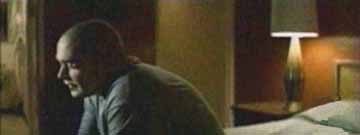 I can get pretty deep on
some of them, talking about things that I haven’t told people before.” Indeed
Aaron has done a lot to improve himself, despite dark thoughts of suicide.
Struggling with severe depression, he says “I’ve had a gun in my mouth. Just
crying and wanting to do it, but not being able to for the thought of what it
would do to the people I was going to leave behind. It took a hell of a lot
more courage to not pull that trigger than it would have taken to pull it.’”
This gives insight into Aaron’s response to a kid who killed himself – “Fuck you
for not having the strength in your hear to pull through…doesn’t mean I should
take my life with my own hands.” With some therapy, he has realized that his
parents did the best they knew how – “I cannot blame this on my father, he did
the best he could for me.” Aaron also seems to have overcome drinking and drug
use, which is alluded to in many of his lyrics. “If you dwell on how terrible
your life has been,” says Aaron, “it will forever remain terrible.” I can get pretty deep on
some of them, talking about things that I haven’t told people before.” Indeed
Aaron has done a lot to improve himself, despite dark thoughts of suicide.
Struggling with severe depression, he says “I’ve had a gun in my mouth. Just
crying and wanting to do it, but not being able to for the thought of what it
would do to the people I was going to leave behind. It took a hell of a lot
more courage to not pull that trigger than it would have taken to pull it.’”
This gives insight into Aaron’s response to a kid who killed himself – “Fuck you
for not having the strength in your hear to pull through…doesn’t mean I should
take my life with my own hands.” With some therapy, he has realized that his
parents did the best they knew how – “I cannot blame this on my father, he did
the best he could for me.” Aaron also seems to have overcome drinking and drug
use, which is alluded to in many of his lyrics. “If you dwell on how terrible
your life has been,” says Aaron, “it will forever remain terrible.”
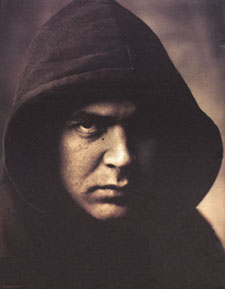 It
is evident that changes in Staind’s music reflect the growth of the band,
especially on Aaron. Time and experience, according to Aaron, have influenced
his lyrics. “I guess just kind of getting older and starting to see things
different, being in a different place in my life when I write the songs. The
titles of the records fit into it all too. During Tormented that was a
hard time for me. Dysfunction was when I hit bottom of my little world,
and now Break The Cycle is where I’m trying to do something about it.
It’s been a natural progression with me getting older and seeing things
differently.” Talking about the gory cover of Tormented, he says, "The
artwork on the first record was, I guess you could say, there for shock value.
There was a knife in a Bible, signifying the lack of faith in religion, and it
was from a collage that Mike made in his attic. It kind of depicted a time in my
life where I lost faith in myself, in religion, in love, in life -- everything.
You know, my lyrics aren't the happiest in the world." He also says, “I use the
word ‘you’ a lot in my lyrics, and it can refer to many different people. I try
to leave as much as I can open to interpretation. But if you know me, there’s
also a lot of me in those songs, things that happened to me in my life. I try
to communicate those tings in a positive way. The lyrics to these songs are a
combination of everything I’ve been suppressing…It took 26 years for me to
realize all the cycles that need to be broken – all the vicious circles.”
Because there is so much that lies behind Aaron’s words, he prides himself in
keeping the music real. “All I did was be extremely honest with myself and put
it in songs, and here I am. Never in my music have I pretended that things were
all right. I might have done that in life, just to get through. But in my
songs, I’ve always been very candid and straight-forward with what I had to
say.” It
is evident that changes in Staind’s music reflect the growth of the band,
especially on Aaron. Time and experience, according to Aaron, have influenced
his lyrics. “I guess just kind of getting older and starting to see things
different, being in a different place in my life when I write the songs. The
titles of the records fit into it all too. During Tormented that was a
hard time for me. Dysfunction was when I hit bottom of my little world,
and now Break The Cycle is where I’m trying to do something about it.
It’s been a natural progression with me getting older and seeing things
differently.” Talking about the gory cover of Tormented, he says, "The
artwork on the first record was, I guess you could say, there for shock value.
There was a knife in a Bible, signifying the lack of faith in religion, and it
was from a collage that Mike made in his attic. It kind of depicted a time in my
life where I lost faith in myself, in religion, in love, in life -- everything.
You know, my lyrics aren't the happiest in the world." He also says, “I use the
word ‘you’ a lot in my lyrics, and it can refer to many different people. I try
to leave as much as I can open to interpretation. But if you know me, there’s
also a lot of me in those songs, things that happened to me in my life. I try
to communicate those tings in a positive way. The lyrics to these songs are a
combination of everything I’ve been suppressing…It took 26 years for me to
realize all the cycles that need to be broken – all the vicious circles.”
Because there is so much that lies behind Aaron’s words, he prides himself in
keeping the music real. “All I did was be extremely honest with myself and put
it in songs, and here I am. Never in my music have I pretended that things were
all right. I might have done that in life, just to get through. But in my
songs, I’ve always been very candid and straight-forward with what I had to
say.”
 One problem
that Aaron hasn't outgrown, however, is his fear of flying. "I have a problem
with flying. I don't know what it is. I've been flying since I was eight years
old, but it didn't used to be a problem. I would fly by myself to see my
grandparents in Florida, and I was fine. I didn't start having problems until
we started touring. There isn't a choice to fly. It's what you have to do to
get the job done. There have times when I've gotten such unbelievable tunnel
vision going down the skywalk to the plane. The tunnel starts stretching out in
front of me, I start to lose balance. It's total craziness. If I don't knock
myself out before a flight, I'd end up having an anxiety attack...One little
thing goes wrong thirty thousand feet up and it's all over. If you're in a car,
which is more dangerous, at least you have control." One problem
that Aaron hasn't outgrown, however, is his fear of flying. "I have a problem
with flying. I don't know what it is. I've been flying since I was eight years
old, but it didn't used to be a problem. I would fly by myself to see my
grandparents in Florida, and I was fine. I didn't start having problems until
we started touring. There isn't a choice to fly. It's what you have to do to
get the job done. There have times when I've gotten such unbelievable tunnel
vision going down the skywalk to the plane. The tunnel starts stretching out in
front of me, I start to lose balance. It's total craziness. If I don't knock
myself out before a flight, I'd end up having an anxiety attack...One little
thing goes wrong thirty thousand feet up and it's all over. If you're in a car,
which is more dangerous, at least you have control."
On an even funnier note, Aaron remembers when he dressed up as a
crack whore, with high heels, red fishnet stockings, a black tube-top, and a
faux-fur leopard print mini skirt, at a Halloween show. "I had the nastiest
blonde wig. I think I might have even thrown it in the dirt and kicked it
around to make it worse. I made a crack pipe out of a soda bottle and a pen and
carried that on stage wearing a sign around my neck saying 'Will Fuck For
Crack.' When the lights came up, there I was with my hairy belly hanging over
the skirt staring out at the crowd. They didn't know what the hell was going
on. Hey, it's Halloween. You have to do something crazy." Aaron also has fun
fishing, golfing, and riding his dirt bike. He always keeps a fishing rod on
the tour bus. While busy on tour, he was able to give golf a try. "That's how
I started because it's easy to roll into the nicest golf course and play. I've
broken 100, but I haven't been playing very long. I've only played like 13
times. So I guess I'm doing pretty good for only playing a couple of months."
Aaron also has a sense of humor when it comes down to hunting. "If there was no
hunting season, deer would overpopulate and starve. It would just cause a
collapse of the ecosystem." Appropriately, he is a member of the National Rifle
Association. "I don't think the key to wiping out inner-city
violence is to ban guns. Criminals are always gonna be able to get
guns; it's gonna be the law-abiding citizens who can't. That's the most
ass-backward way to fix a problem I've ever heard."
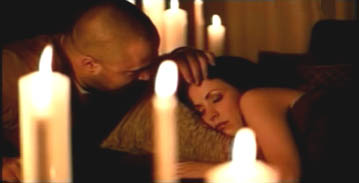 Without a
doubt, the biggest influence for Aaron is his wife, Vanessa. “She’s an amazing
person,” he says, “I can tell anything to. I’ve told her everything that’s
happened to me, and she hasn’t felt any differently about me.” Playing a vital
role in helping Aaron break the cycle, they hope to someday have a family. “I
never wanted that until I met my wife and wanted her to be the mother of my
kids. There's nothing in the near future though, I don't want to be an absentee
father, I want to see it all.” Like Aaron’s shyness from fame, Vanessa also has
had to adjust to the band’s success. “My wife certainly doesn't want any part
of this business either. She doesn't want any of the extra attention. It
absolutely embarrasses the shit out of her when kids ask her for her
autograph.” Vanessa adds, “Sometimes I say to Aaron, ‘Why couldn’t you be a
plumber or something normal?’ I never wanted a lot of money. Money changes
people. I guess we’ll see what happens.” Nevertheless, as with most big groups
in the music industry, Aaron does not support Napster. He says, “Napster is a
great thing for bands that are unsigned but it's not a good thing for bands that
are trying to meet contractual obligations and make a little something. The
system isn't set up in our favor and everyone gets money before you and Napster
just takes what little money you do get right out of your hand.” Without a
doubt, the biggest influence for Aaron is his wife, Vanessa. “She’s an amazing
person,” he says, “I can tell anything to. I’ve told her everything that’s
happened to me, and she hasn’t felt any differently about me.” Playing a vital
role in helping Aaron break the cycle, they hope to someday have a family. “I
never wanted that until I met my wife and wanted her to be the mother of my
kids. There's nothing in the near future though, I don't want to be an absentee
father, I want to see it all.” Like Aaron’s shyness from fame, Vanessa also has
had to adjust to the band’s success. “My wife certainly doesn't want any part
of this business either. She doesn't want any of the extra attention. It
absolutely embarrasses the shit out of her when kids ask her for her
autograph.” Vanessa adds, “Sometimes I say to Aaron, ‘Why couldn’t you be a
plumber or something normal?’ I never wanted a lot of money. Money changes
people. I guess we’ll see what happens.” Nevertheless, as with most big groups
in the music industry, Aaron does not support Napster. He says, “Napster is a
great thing for bands that are unsigned but it's not a good thing for bands that
are trying to meet contractual obligations and make a little something. The
system isn't set up in our favor and everyone gets money before you and Napster
just takes what little money you do get right out of your hand.”
Since the beginning, as Staind’s front man, has become quite the
national spokesperson for troubled teens. With so many people relating to his
“reality-based” lyrics, Aaron finds it fulfilling. Although he persistently
refers to fans as “kids,” the people who live in his words are more than just
teenagers. “It’s kind of rewarding for me without setting out and trying to –
it seems I’m helping kids through what they’re going through. That wasn’t’
really our goal or plan, it just happened. I’m being honest about how I feel,
and it seems like of a lot of people are getting it and relating.” Yet Aaron
also shows great discomfort in having people so readily relate to his touching
words. He wishes that teens wouldn’t relate because he doesn’t want anyone to
go through the pain and torment he endured growing up. "It's been crazy, and it
totally trips me out. Kids will come up to me and thank me for saving their
lives. That's really heavy. I don't know what to think about that. It's so
amazing to me that I can help them, but at the same time it kinda bums me out in
the sense that they're relating to these words that I'm writing, that they're
feeling it so strongly. I can only imagine what's actually happened to them. I
wouldn't wish being able to relate to what I was writing about upon anybody."
In addition, he calls the attention “unnerving,” especially since he considers
himself a reclusive. “I didn't get into that to be a ‘rock star.’ I got into
this because I love music and my lyrics are my only way to express that side of
myself.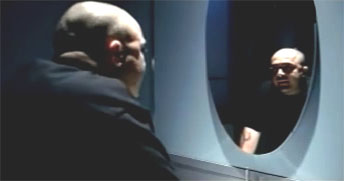 I have a hard time
getting it out any other way. But all the pressures and the focus that's put
upon me is extremely uncomfortable for me. I'm a private person and being on
tour and being on the cover of Rolling Stone is such the complete
opposite of what I'm used to having.” Despite his sudden jump to fame and not
knowing how to fully deal with it, he tells Staind fans, “I hope you realize
that just because I tend to hide from you sometimes, you don't mean any less to
me. You are everything to me, you're the reason we're here. I just have a hard
time dealing with the adoration. It's not something I've dealt with in my
life.” I have a hard time
getting it out any other way. But all the pressures and the focus that's put
upon me is extremely uncomfortable for me. I'm a private person and being on
tour and being on the cover of Rolling Stone is such the complete
opposite of what I'm used to having.” Despite his sudden jump to fame and not
knowing how to fully deal with it, he tells Staind fans, “I hope you realize
that just because I tend to hide from you sometimes, you don't mean any less to
me. You are everything to me, you're the reason we're here. I just have a hard
time dealing with the adoration. It's not something I've dealt with in my
life.”
|



